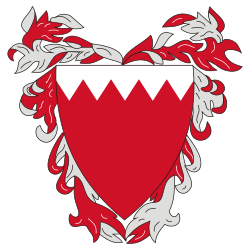Bahrain–European Union relations
 |
|
European Union |
Bahrain |
|---|---|
Bahrain–European Union relations are the international relations between the Kingdom of Bahrain in the Persian Gulf and the European Union (EU).
History
Bahrain, as part of the Gulf Cooperation Council (GCC), signed a cooperation agreement with the EU in 1988. This paved the way for closer economic and political relations. In 2013, the GCC and EU ministerial meeting occurred in Manama and was co-chaired by the EU High Representative-Vice President Catherine Ashton and the Bahraini Foreign Minister Shaikh Khalid bin Ahmed Al Khalifa.[1]
Bahrain has been criticised by the EU for its treatment of political activists during and after the 2011 Bahraini uprising.[2]
Environment
In May 2015, Bahrain and the EU have expressed interest in hosting joint environmental projects, which includes preservation of the country's biodiversity and a review of environmental legislation.[3][4]
Trade
The EU is the GCC's largest trading partner, valued at €152 billion which accounts for over 13% of total exports. In turn, the GCC is the EU's fifth largest export market, which is worth €95 billion.[1]
Since 1990, the GCC and EU have entered negotiations for a free trade agreement. However, recurrent disputes have resulted in the talks being suspended by the GCC multiple names, the most recent of which being in 2008.[1][5]
Further reading
References
- 1 2 3 "EU relations with the Gulf Cooperation Council (GCC)". European Union. External European Action Service. Retrieved 23 July 2015.
- ↑ "EU/Bahrain: EU Should Demand Release of Activists". Human Rights Watch. Retrieved 23 July 2015.
- ↑ "Official document" (PDF). Draft Recommendations from Bahrain Europe Environment Week. Arab Regional Centre For World Heritage. Retrieved 23 July 2015.
- ↑ "Joint Bahrain-EU environmental projects on the way". TradeArabia. 28 May 2015. Retrieved 23 July 2015.
- ↑ Savage, Bernard (2008). The Report: Bahrain 2008. Oxford Business Group. p. 23. ISBN 9781902339979. Retrieved 23 July 2015.
